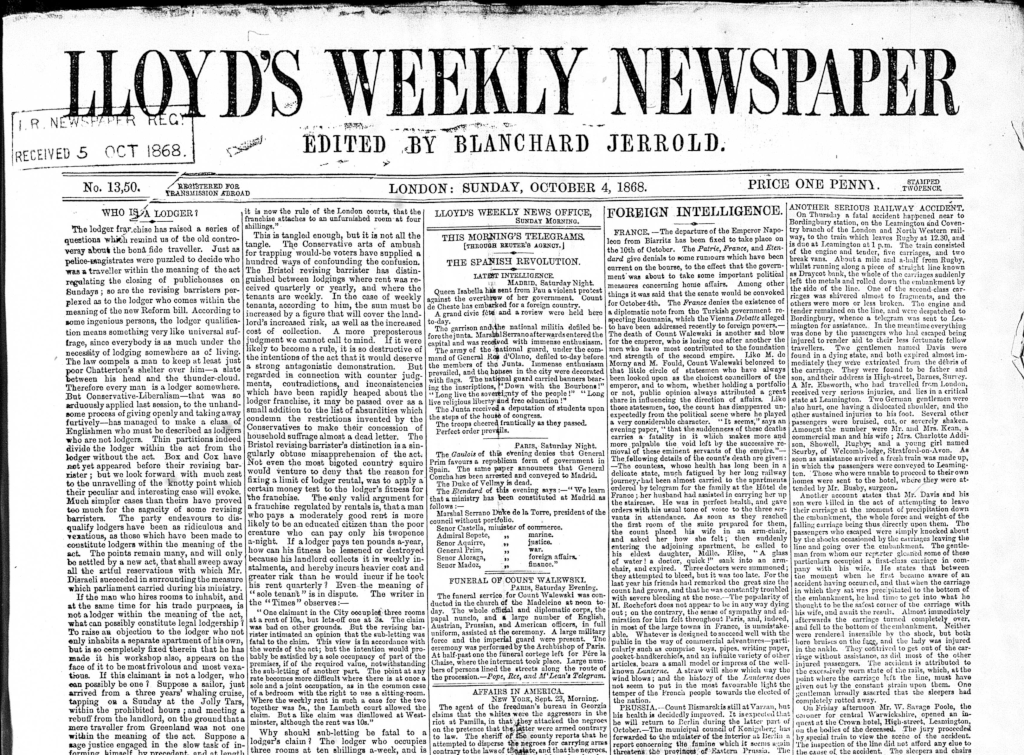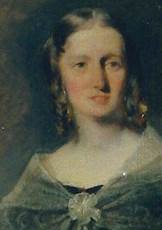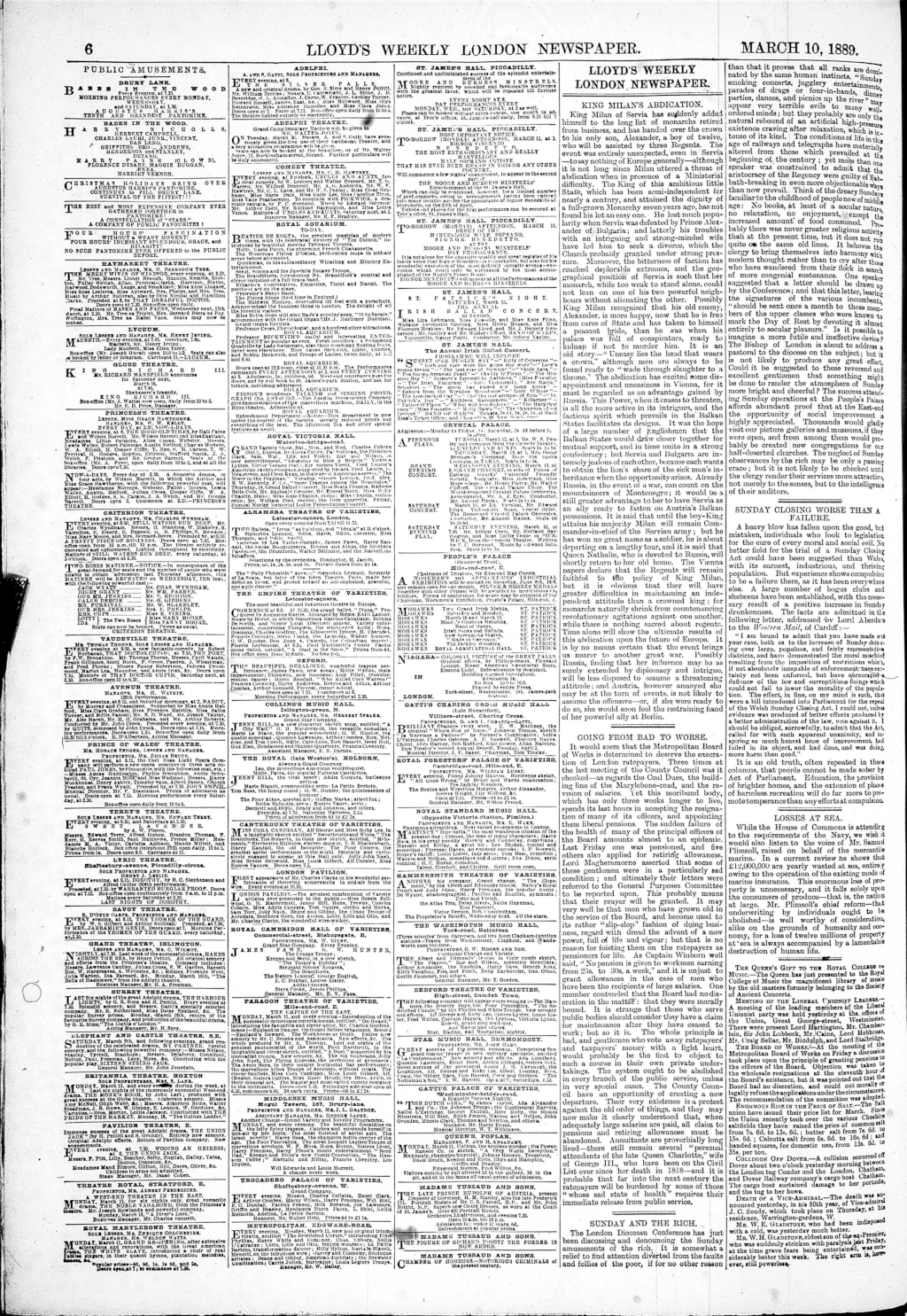Lloyd the Liberal — Lloyd’s Weekly
A national Sunday newspaper in general circulation was a gigantic step for Lloyd to take in terms of his business, reputation and future. He planned and tightly controlled the tenor of all its contents.
At the beginning, Lloyd’s Weekly was outspokenly radical. It denounced all political parties and factions with equal force. This suggests a desire to influence government by means of the popular press but, even so, his motives would not have been that simple. The readers were even less likely than him to support Whigs or Tories, so the paper's radicalism may have sprung from shrewd market analysis.
Equally shrewd was Lloyd’s choice of a Sunday paper. Not only was the workload one sixth that of a daily, but it was also the only day of the week when his target readers would have had any time to enjoy it.
In 1842, when the paper was launched, most working men and all women were excluded from the vote, so government by Whig or Tory would have been a matter of indifference. What little energy they had left for political thought would more than likely have been devoted to radical causes.
As working men and their wives were Lloyd’s target readership, this gave him reason to follow the radical line. For the paper to influence policy would have been a bonus. That is not to say that he was only in it to make money. He had to break even on cost as part of a rational business plan.
His own radicalism finds some support in the way he kept the management of content in his own hands. The only duty of the “editor” was to write the leading article, and that was subject to Lloyd’s own scrutiny.
Whatever Lloyd’s Weekly became in its maturity, it certainly did not start as a Liberal paper. The first stamped issue on 27 November 1842 was introduced in this way: “We have no private interest to serve — no party to laud. We enter the political ocean a free trader.”
The leader on 8 January 1843, which had already dismissed the Whigs as “almost beneath contempt” and called the Tories “wrangling imbeciles”, ended with:
[W]e know no party but the Country. Of Tory or Radical — Whig or Chartist — Utilitarianism or No-utility-at-all-ism — we know nothing as a body so denominated; but we should rejoice to see a fight between the lot, after the fashion of the tiger-cats of Kilkenny — which would leave the field clear to honest men and good patriots.
Lloyd’s Editors
Robert Bell was first to fill the editor/leader-writer role. He had twice been editor of the Weekly Dispatch. This was a popular Sunday paper that, in its early days, recognised the potential of sport to attract readers. It drew scorn from established titles but its longevity (1801–1961) proved them wrong.
The second editor was William Carpenter, Chartist and author of the radical Peerage for the People — a work devoted to short biographies of all the peers of the time. This drew such outrage that Carpenter felt obliged to write an exculpatory introduction to this edition. The political standpoint continued to be radical.
These two lasted less than two years each and Lloyd seems to have managed without employing a replacement for the next seven or eight years, preferring to commission the leaders from different writers week by week.
In 1852, he decided to appoint the celebrated writer and playwright, Douglas Jerrold, as editor to raise the paper's prestige, starting with the edition of 18 April (the 471st). Circulation immediately picked up.
Like the paper, Jerrold has been labelled Liberal, but this was not apparent immediately. The leaders took the independent stance already in place. His style was witty and satirical. It was much less florid and outspoken than his predecessors’, but it was also more ambiguous.
Jerrold continued to speak favourably about radicals such as John Bright and Richard Cobden, co-founders of the Anti-Corn Law League, who became Liberals. He praised Lord Palmerston's record overseas when war minister but castigated his inertia on domestic politics.
After Douglas died on 8 June 1857, Blanchard Jerrold took on the role and kept it until his death in 1884. He had been working with his father and the transfer was seamless.
 |
| Lloyd’s Weekly Newspaper, 4 October 1868 |
With Tom Catling as its next editor, Lloyd's Weekly probably became more overtly supportive of the Liberal Party as he was a party member. At least in retrospect, he seems to have been swayed by a measure of political bias. He wrote:
“Lloyd’s, with the strongest Liberal principles, ‘broad-based upon the people’s will,’ had always supported and upheld Gladstone. He was regarded, not only as the greatest intellectual force of his time, but as a veritable high priest of true radical principles.”
Such overblown adulation may have coloured public perceptions of Lloyd’s own position, as may the paper’s attitude in the 40 years after he died. Catling spoke to Lloyd about the 1886 Home Rule Bill for Ireland. It meant that he would either have to disagree with Gladstone or risk losing readers if the paper supported it — a fate already suffered by the Daily News. Lloyd was sympathetic over the dilemma but silent on his own view on the matter. Whatever this was, Catling would lose his job if he lost readers.
Summary
It is possible that Lloyd supported the party in the last decade of his life, of course. All his obituaries say that he was a party member. He was a founder of the National Liberal Club, reputedly to the tune of £5,000-worth of shares that could not be sold. He was also a member of the Reform and London Farmers’ Club, so it may be that he just liked clubs.
A cynic might say that overt support of the Liberal Party would help him towards the honours normally granted to leading newspaper publishers. This would not accord with the independence of his general character, but he might have done so under family pressure. The government’s failure to oblige still seems more likely to have come from disapproval of his irregular marital history, however.
In its earliest incarnation, the paper had disagreed with the party on most policies, and more often on the lack of them. Later, when the leaders had lost some of their stridency, no Liberal politician could have relied on the paper’s support. It was far from being the party’s mouthpiece.
Lloyd’s Weekly consisted mainly of objective reporting. Its political views were expressed only in the leading articles. Even analysing the 2,500 published before Lloyd’s death would be a herculean task, so this account is somewhat impressionistic.


